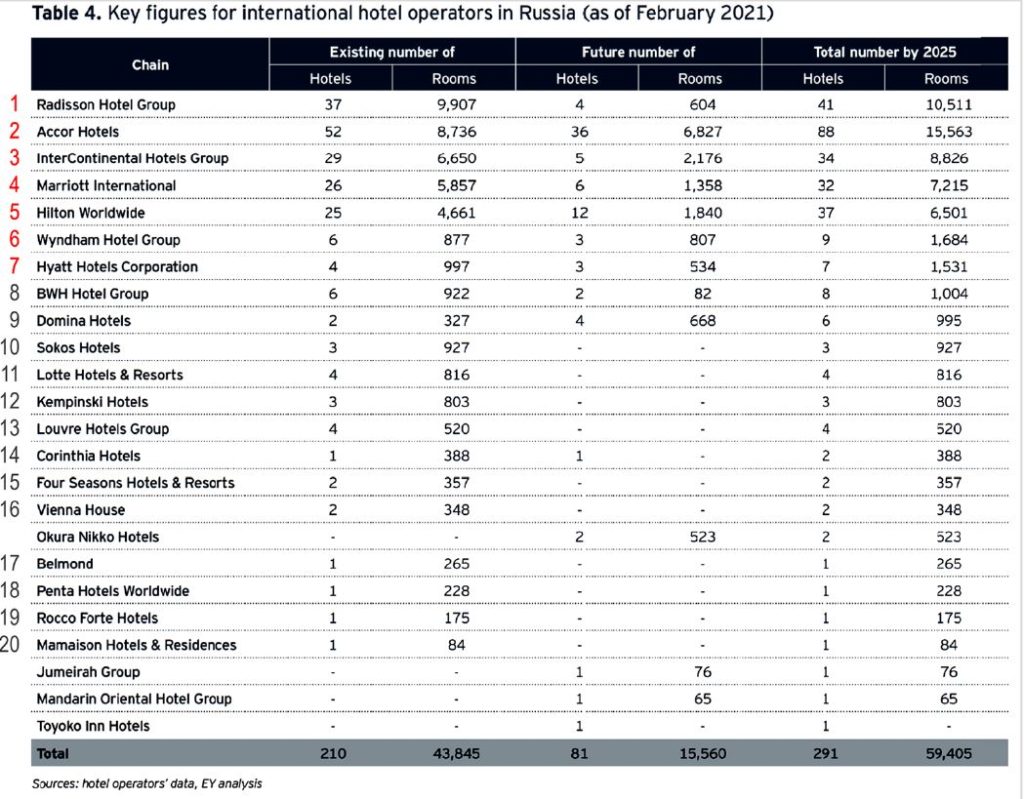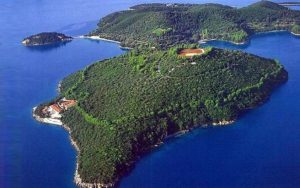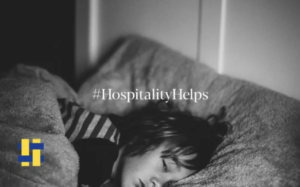News From the Ukrainian Hotel & Resort Association And Global Hotel Companies Response to The Russian Invasion
Date: 19th April 2022
Location: Ukraine…and Russia
What Did They Say: We have repeatedly appealed to hotel operators to stop supporting the Russian economy and war machine and withdraw their brands from Russia
Who They: The Ukrainian Hotel & Resort Association (UHRA) and State Agency for Tourism Development (SATD)
Main photo: The InterContinental Moscow – Tverskaya – one of the 200 global brand hotels in Russia
Two separate letters were sent to the CEOs of Russia’s seven top international hotel groups on 14 March and 18 March 2022. A press release was issued on 20 March 2022. We appreciate Best Western for making an ethical stance to be the first hotel company to suspend its five operating hotel franchises in Russia and have received a private notification to UHRA from Louvre Hotels Group (four branded hotels in Russia) that they intend to depart Russia soon.
Nevertheless, none of the large hotel groups has made any tangible commitment to reducing their current activity in Russia unless they are forced to do so by sanctions.
One of the leading hotel group CEOs has been courageous enough to make a personal statement on the war in Ukraine, Accor Chairman & CEO Sébastien Bazin, when on 24 March, he made several statements at the Skift Forum Europe 2022. Accor’s leader made the following four distinct reasonings”, which we comment on below:
“Accor has been existing for 50 years now. And we’ve been in countries of war, probably 30 or 40 times in the last 50 years on different continents. And Accor never pulled out of any hotel activities.”
The UHRA & SATD consider this reasoning invalid. As the highly respected historian Yuval Noah Harari recently stated, “Since 1945, not a single internationally recognised country was wiped off the map by external invasion. This is a fantastic achievement, which is the basis for everything we have: for our medical services, for the education system, and this is all now in jeopardy…”
“If you want each of us to witness what’s happening in the country, you need somebody to shelter and host those people. All of our hotels in many different countries are full of media, NGOs, and Western diplomats. They need to be hosted; otherwise, they cannot go. And otherwise, you won’t have any Bloomberg or CNN or any people basically on the news.”
The UHRA & SATD consider this reasoning invalid. Accor’s 52 remaining hotels that have not been forced to close are not full of media, NGOs and diplomats; just one small hotel in Moscow would be sufficient to accommodate the scarce numbers remaining western clientele. Since early March 2022 and the closure of Dozhd (TV Rain) and the Radio Echo of Moscow, there is finally no independent media in Russia, and there has been an unprecedented, national crackdown on independent journalism and dissenting voices. Just two days before Mr Bazin’s comments, on 22 March, the Russian State Duma passed the media restriction law threatening sentences of up to 15 years to those “falsely informing as per Russian state bodies activities abroad”, including calling this war “a war”.
Trustworthy media does not now operate in Russia. Besides media operations, Putin has abolished almost every foreign academic and human rights NGOs in the Russian Federation.
“I’m making a very distinct decision between Kremlin and Mr Putin and the population of Russia. And I can tell you, being on the phone with them, they are in tears, those employees in Russia. They don’t understand what’s going on. The last thing I want is to impair those for something they have had nothing to do with.”
The UHRA & SATD consider this reasoning invalid. The standard pretext for all companies that are not ready to take an ethical stand is to hide behind so‐called obligations to employees. However, being high‐profit & asset‐light businesses, the hotel operators have just a handful of employees on their payroll in Russia. These are the owners of the respective branded properties who employ all employees (with some rare exceptions). Franchised hotels are staffed solely by the employees of the franchisees (hotel owners). To limit all responsibility and liability, the business model of all operators in Russia implies that all employees, including in most cases the general manager, are employees of the owner and NOT the operator. When a hotel is “deflagged” from a brand, the employees carry on without any change as employees of the owner with the same valid contracts under Russian law. Many individuals, who disapprove of Putin’s actions in Ukraine, have already left Russia, with over 200,000 relocating to Armenia, Azerbaijan, Georgia, Montenegro, Serbia, Turkey, Uzbekistan, etc. Of those remaining, according to the Levada‐Center, 83% of Russians approve of the cruel unprovoked invasion into Ukraine!
“Accor does not make a dime in Russia.” The UHRA & SATD consider this reasoning invalid. The hotel operators, including Accor, plead for sympathy with low occupancies in commercial cities due to more conscientious international corporations in other industries withdrawing from Russia; their fee income streams are dramatically reduced. But they do not highlight the performance of their hotels in Russian resort locations such as Sochi. With travel restrictions on Russian citizens due to the war and Covid, Russian domestic tourism has a massive uplift. Even before this tremendous growth, medium to large hotels in Sochi could yield royalty and system fees of the operator of over €0.5 million, while some larger upscale hotels ‐ over €1.0 million; Accor had eight hotels in the Sochi region at the beginning of 2022.
The UHRA & SATD are grateful to Mr Bazin that he broke this treacherous silence that is the modus operandi of other international hotel CEOs, the same distancing and denial of events used to justify the Kremlin’s “special military operation” are those that justify Hilton, Hyatt, IHG, Marriott, Radisson, Wyndham (and others’) ongoing acquisitive hotel operations.
The first response of the hotel operators is to point to the accommodations being provided free of charge to refugees by the franchisees and owners of their branded properties in Eastern Europe. The UHRA & SATD appreciates wholeheartedly everyone that supports the work that goes to the approximately 10 million internally displaced and refugees, of which our own families are counted.

…and the other hotel companies’ formal responses?
April 12th: IHG not to resume Russian investments in near future
The company closed its corporate office in Moscow but will continue to support its employees. Hospitality company IHG Hotels & Resorts has revealed that it will not resume any investment and development activity in Russia in the near future.
IHG, which owns 17 brands under four collections, took the decision in response to Russia’s invasion of Ukraine. The latest update comes a month after the company suspended investment, development activity and new hotel openings in the country.
In addition, the company revealed that it is closing its corporate office in Moscow but will continue to support its employees. IHG in a statement said: “We continue to be deeply saddened by the humanitarian crisis as a result of the war in Ukraine. We have previously announced the suspension of future investments, development activity and new hotel openings in Russia. We do not intend to resume any investment or development activity in the foreseeable future.”
“These steps followed significant donations to our humanitarian charity partners and a commitment to work with hotel owners in other countries to shelter refugees.” IHG operates in Russia through long-term management or franchise agreements with independent third-party companies that own the hotels.
The company along with hotel owners are assessing these contracts due to the rising operational challenges in the country. IHG said that these contracts are complicated and will need some time to evaluate and process them. Meanwhile, the company plans to continue supporting its teams in the hotels in Ukraine and Russia.
The company will also donate profits from Russia to support relief efforts.
Last month, Hyatt, Hilton, Marriott International and Accor suspended their future development activities in Russia in response to the crisis.
Marriott: April 7th: “As the war in Ukraine enters its second month, the humanitarian crisis has continued to worsen. We are deeply concerned for the more than 4 million people who have fled Ukraine for safety in neighboring countries, millions more displaced within the country’s borders, and countless others impacted by the fighting. Associates across the company continue to organize and respond to help those in need. Supporting the communities in which we operate has always been part of Marriott International’s culture and the company has a long history of working with numerous international organizations in support of refugees and displaced people globally.
Marriott Bonvoy members can donate points here to join us in supporting relief efforts. Marriott Bonvoy will be matching donations point-for-point for World Central Kitchen and UNICEF up to 100 million points donated this year. To date, over 46 million Marriott Bonvoy points have been donated.
We are undertaking relief efforts of our own, including many of our hotels providing accommodations and supplies to refugees fleeing their homes. Our hotels and associates have raised over $1.7 million in cash and in-kind donations. More than 80 of our hotels in neighboring countries have signed up to provide free hotel stays for refugees through Hospitality Helps, donating over 11,000 free room nights to date.
The J. Willard and Alice S. Marriott Foundation has donated $1 million to support associates and organisations on the ground, including UNICEF, World Central Kitchen, International Rescue Committee, International Federation of Red Cross and Red Crescent Societies, La Strada, and the International Organization for Migration, as they provide services and relief to those impacted by the crisis. We have deployed internal disaster relief funding for associates and their families who have left Ukraine to assist with resettlement aid, including food vouchers, transportation assistance, medical, and legal support.
What’s the long game? Do hotel brands, investors and other stakeholders have a responsibility that exceeds profits and drives a stake into the heart of wrongdoing?
Russia is the largest country in the world by area, but despite its size, foreign direct investment is small. According to the IMF, net inflows in 2020 amounted to USD$9.4 billion, the lowest its been since 2003. By contrast, and according to the Bureau of Economic Analysis, foreign direct investment in the United States hit USD$4.63 trillion in 2020. At its height, FDI into Russia hit a high in 2008 of USD$74.7 billion.
Likewise, hotel investment and development from outside Russia is small. Scott Antel is a hospitality-focused lawyer and member of the International Society of Hospitality Consultants. He has extensive knowledge of the hotel industry in Russia having lived in the country for 24 years. He now resides in Dubai and recently took in “refugee” friends fleeing not Ukraine, but Russia because, he said, “They believe the wall is going back up and they won’t be able to leave.”
“Foreign investment dried up over the last seven years,” he said. FDI into Russia dropped USD$60 billion from 2013 to 2017. The root of the decline can be placed on many factors, first and foremost an unstable legal environment, Antel argues. There was significant retrenchment in the wake of Russia annexing Crimea in 2014 and the ensuing sanctions, which restricted Russia from accessing Western financial markets and services and put an embargo on many Russian exports.
According to Antel, most hotels in Russia are owned and operated by Russians. He believes that hotel brands will soon pull their flags and have legal standing to do so.
“I imagine they will have to step back,” he said, also citing that some brands had flags in Crimea and took them down in the wake of the annexation. “And those sanctions weren’t as bad as now,” he said.
Brands typically remove flags from hotels for non-performance or those that don’t stay compliant with brand standards. There is annual attrition.
In this case, according to Antel, brands have the authority to exit a hotel without damages. “Every contract has a restricted persons clause,” he said. “If you become restricted, because the hotel’s ownership or the country it is in comes under any sanctions regime, that is automatic for a brand to terminate without damages. It’s a material breach and may, depending how the clause is written, allow the brand to sue for damages,” although he doubted many brands would take that step.
Antel cited precedent, when in the late 1990s Starwood Hotels and Resorts exited a property in St. Petersburg after it was sold to a new owner with ties to Libya.
“It is quite distressing: Thirty years of progress and then ‘back to the USSR’ in a matter of weeks,” he said. More brands and companies are making their business feelings known. There is now exists a Ukraine Corporate Index, which tracks company responses to Russia’s invasion.
In the travel and hospitality space, Expedia ceased the sale of travel to and from Russia; meanwhile, Airbnb announced that it will offer free, short-term housing to up to 100,000 refugees fleeing Ukraine. In a further magnanimous gesture, people around the world are making Airbnb bookings in Ukraine knowing full well they will not use them in order to get money in the hands of Ukrainians.
Lovemarks is a marketing concept developed in 2004 by Kevin Roberts, then the CEO of the advertising agency Saatchi & Saatchi. He argued then that brands in their current iteration were less influential and what they needed to refortify was love. Lovemarks transcend brands; they reach your heart as well as your mind, he contended.
Many brands could show a little more love right now.
THPT Comment: Who hurts the most by sanctions in shutting hotels in Russia – the local staff, the franchise owners, the global brands or the brand owners? We believe that the most effective sanction is to open the eyes of the midled-age and elderly mass of the Russian population that believe Putin’s lies…. for them to demand a stop to the war. When the man in the street can’t get his McDonald’s – maybe that works!
First Seen: Various press releases and articles
The Hotel Property Team (THPT) are a small group of highly experienced business professionals. Between us, we provide a range of skills and experience which is directly relevant to those involved in the hotel property market.
For more information – Visit www.thpt.co.uk or email info@thpt.co.uk



